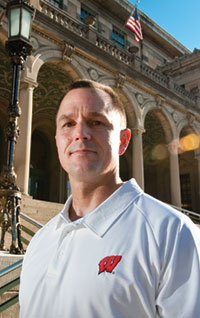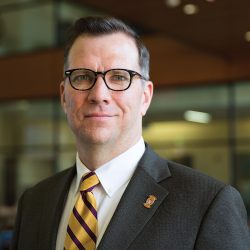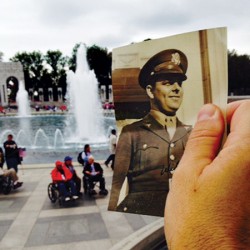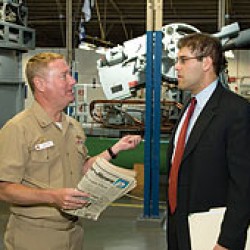John Bechtol
With more student veterans on campus, he helps navigate the path through college.
In just three years, UW-Madison’s population of students who are military veterans has almost doubled, reaching more than 650. Whether recently returned from overseas, just called up for active duty, or facing post-traumatic stress disorder, members of this growing group now have a one-stop contact for seeking benefits and services, and connecting to other student veterans on campus.
John Bechtol, the UW’s first assistant dean for veterans, wants to stay in touch with student veterans from the time they apply for admission until they graduate. Appointed last September, Bechtol previously directed the university’s army ROTC program for four years; last summer, he retired from the military after twenty-one years of service.
Q: Where were you stationed?
A: West Berlin, Germany. I was there when the wall came down; [it was] pretty exciting. … Checkpoint Charlie opened, and it caught everybody by surprise. … I was stationed in West Berlin, then Oklahoma, North Carolina, California, Alaska, Rhode Island, Kansas, and then Wisconsin.
Q: What was the best part of your experience in the military?
A: The people, the soldiers in the army. … Talk about diversity. You get people from all kinds of backgrounds, but everybody’s working for the same purpose, and it’s something other than money.
Q: Is there a way to describe the average student veteran at the UW?
A: Our service folks are a little more mature than the average incoming freshman. Some of that’s due to age, but some of that’s due to experience. They’ve already been put in a position [of] close quarters, living with people that they don’t know … They form bonds with [each other] and they don’t see it as a big deal.
Q: Is that an advantage for them coming into the college experience?
A: I think so. … A common theme, too, among student veterans who are coming off of active duty into the freshman classes is that they’re serious. They’re here to learn. They’ve sown those wild oats.
Q: On the flip side, what are some of the biggest challenges you think they’re facing?
A: A lot of them complain, “I showed up; I didn’t know where to go to get student benefits. I’m looking online and there’s nothing there.” So that’s something I’m trying to alleviate as far as the bureaucracy — streamline, make it personable. This is a huge campus. Trying to find the right person can be a challenge.
Q: What, if anything, has surprised you the most so far?
A: [Student veterans] want to build a veterans community, and that energy is there, and they really want to do it. … I thought I was going to have to do more shoving. … It’s a core group. I think it’ll snowball very quickly.
Q: What reactions are they getting from their professors and other students? Is campus a supportive place?
A: I think overall the campus is very supportive. I think this generation of students differentiates between executive decisions and the folks that have to carry [them] out. As long as it’s a legal order, they’re going to take it up and do their best to carry it out.
Published in the Summer 2009 issue




Comments
No comments posted yet.